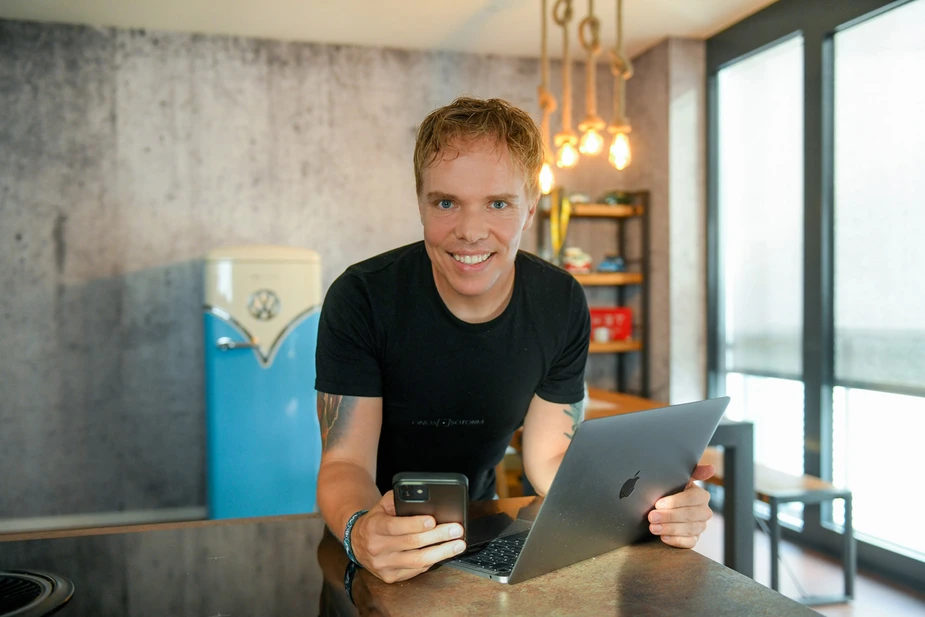“I live in the future”: A glimpse into Future Living
Thanks to smart home technology, everything in Stefan Schwunk’s loft can be controlled using voice control and an app. Water damages, too, are now a thing of the past.
Imagine yourself living alone. In spite of this, you wake up every morning to the smell of fresh coffee, the shutters open automatically, the oven is preheated ready for the croissants, and the speakers softly play your favourite tune. All that is left for you to do is to check the charging status of your electric car before driving to work. Thanks to smart sockets and other technology, all this is already a reality.
Future Living Berlin has equipped 90 flats on Groß-Berliner Damm and Konrad-Zuse-Strasse with all the technological accoutrements you could possibly wish for. The apartments are accessed with a chip card, lights and shutters can be controlled and pre-programmed via phone, the TV is smart, and the elevator is completely button-less. All 14 buildings are interconnected. When the fire alarm goes off in one of them, tenants in all houses are warned. Water sensors quickly discover any leakage.
Smart technology is a new experience for most, according Birgid Eberhardt, the Smart Home / AAL department head at GSW Gesellschaft für Siedlungs- und Wohnungsbau Baden-Württemberg mbH, which is the company operating Future Living: “Very few people have had any experience with smart homes; some may have had digital radiator control valves, or a smart lighting system, smart speakers, or a robot vacuum cleaner. Around 15 percent of tenants were familiar with digital locking systems. But nobody had lived in a smart home apartment before.”
The first tenants moved in early last year, and all the apartments were occupied by the end of 2020. By people across all age groups. In addition to “very young tenants under 35 years of age” (55 percent), people over 65 (20 percent) also got a taste for it. Even two 80-year-olds were persuaded by the convenience.
The smart offerings are now used by people from 26 nations. Eberhardt, who also works as a project manager for the ForeSight research project, pays particular attention to accessibility. “Our project aims at taking blind and deaf people as well as people from all nationalities into account. Did you know that facial recognition doesn’t work on all people? We want to change that.”
Stefan Schwunk (43) was also immediately excited by the innovative project. “When I stumbled upon Future Living, I got a big smile on my face and thought: how awesome is this? It has all the features I set up myself at my house in Bremen but for free, as part of the rent. I live in the future.”
During lockdown, he took part in the viewing via Facetime and was immediately convinced. In early February, he moved into his 75-qm loft that he furnished in the industrial style using wood, concrete, and steel. Ordered online, his furniture was delivered directly to his smart and energy-efficient home.
Thanks to the solar panels on the roof, the house produces its own electricity. The heating is powered by heat pumps. Thirty-eight percent of the estate’s total power consumption is produced by solar energy; the power storage system contains 180 kilowatt-hours. That’s quite a lot, according to Eberhardt. All things failing, is there emergency power? “Unfortunately, not. If the electricity is gone, you have to use a key.”
In the lobby, the smart home manager displays the current electricity use. “I actually look at the smart home display quite frequently to find out how much is currently used,” admits Schwunk. "I use around 109 watts a month, although my two computers are running all the time, the speakers in the bathroom play music automatically as soon as someone enters the room, and I am usually charging my camera or cell phone.”
The 43-year-old runs a YouTube channel called “Schwunkvoll”, where, among other things, he tests electric cars and talks about prejudices against smart technology. Schwunk also recently started the “Einfachkoch” cooking channel. It’s not like he needs a TV studio for it. His flat is a perfect location for recoding videos.
Using the train, it takes him half an hour to get to Alexanderplatz, where he works as a quality manager in the e-mobility sector for a Volkswagen joint venture. Since he can get to the supermarket and the gym quickly by foot, he hardly uses the complimentary car sharing service that comes with the apartment. For longer distances, he uses his own car: a black Porsche with an electric engine. He travels to Bremen every two weeks to visit his six-year-old daughter.
She, too, has no reservations towards digital technology. “She knows exactly how to call dad over Facetime, even though she can't read yet, and sends me voice messages and occasionally a digital kiss.”
Susanne Gietl for Adlershof Journal
